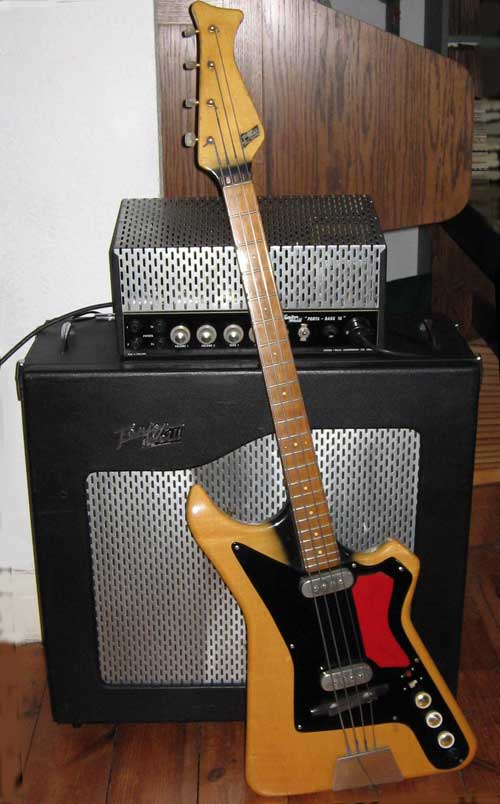FENTON-WEILL AMPLIFIERS
- UK AMPS FROM THE EARLY 1960's


c1963/64 Fenton-Weill Porta-Bass 15 Amplifier & Contemporary F-W Contrabass Guitar - Courtesy of Andrew Briggs.
Fenton-Weill amplifiers were made by Henry Weill in London in the early 1960s. They seem to be more obscure than Selmer, Watkins/Wem or even Bird amplifiers, and are quite rare today. We do not have a great deal of information about Fenton-Weill or the range of amplifiers, and these pages are therefore as much an attempt to collect information as to publish it.
Henry Weill was an early business partner of Jim Burns (who went on to become the "British Leo Fender" with his later Burns-London guitars and amps).. In 1959 they commenced the manufacture of guitars under the Burns-Weill brand, but the association was relatively short-lived and within a year they went their separate ways. Henry Weill continued to make guitars and amplifiers, initially as Weill-London but soon afterwards changed to Fenton-Weill. (Fenton was the model name for one of the Burns-Weill guitars).
He may have started working out of
the
basement of his London home (237, Acton Lane, London W4, which remained
his
business address), but by 1963 a factory was established at 96 Lots
Road, London
SW10, employing up to 15 people engaged in the manufacture of guitars
and
amplifiers. The output must have been quite prolific, as in
addition to his own brand of guitars and amps he also made models for
other
companies, notable Hohner and the early Futurama
amplifier
range for Selmer. Apparently he was no businessman though,
preferring design
and innovation, and Fenton-Weill went bankrupt in 1965. After this,
Henry Weill
preferred to work as a one-man-band, operating out of the basement of
his London
home. Later in the 60s he chose to concentrate upon PA and disco
installations for clubs, an expanding market which he may have found
more
profitable. We believe the guitars and amplifiers were produced from
1960 until
around 1965.
Principal sources :
"The Burns Book", by Paul Day
The Personal Recollections of John Hornby-Skewes, more of which can be found HERE.
HORNET (1963-65)
CADET (1963-65)
BLACK STAR (1962-63)
GOLDEN ARROW (1963-64)
AUDITORIUM 21 (1961-1963)
AUDITORIUM 30 (1962-63)
DUALMASTER COMPACT
DUALMASTER PACKAWAY
BASS 15 & CONTRA-BASS 30 (1962-63)
PORTA-BASS 15 (1963-65)
STEREO REVERBERATOR (1961-63)
STUDIO 20 PROTOTYPE (An experimental amplifier?)
.jpg)
February 1964 - Fenton Weill advertising their stand at that year's Frankfurt Trade Fair.